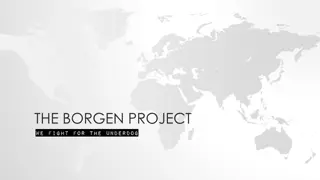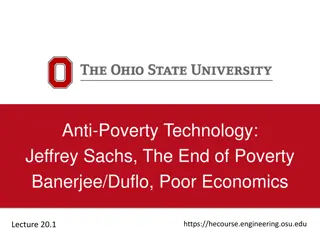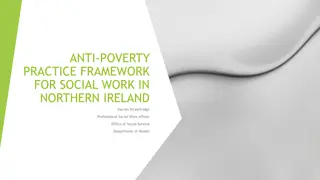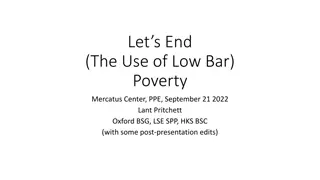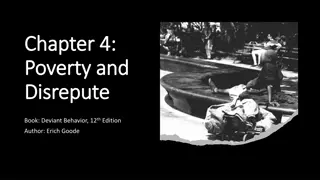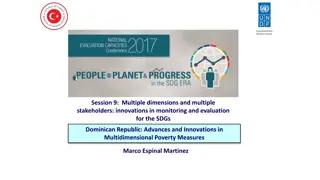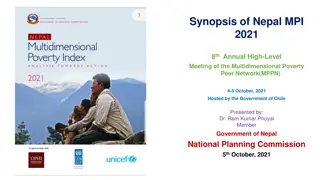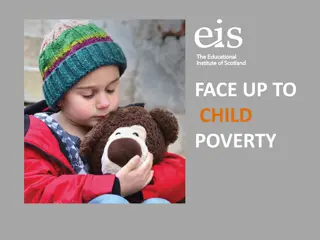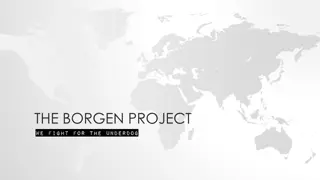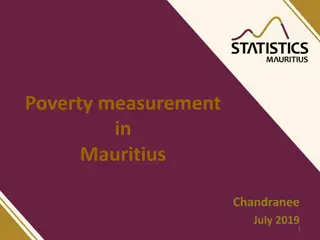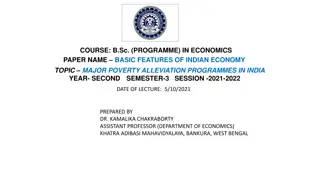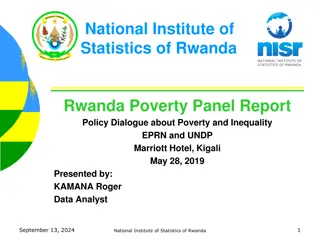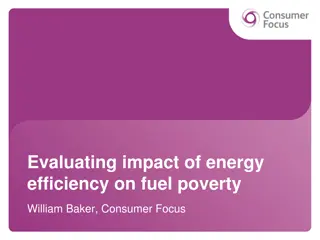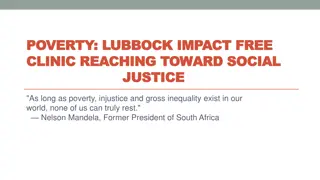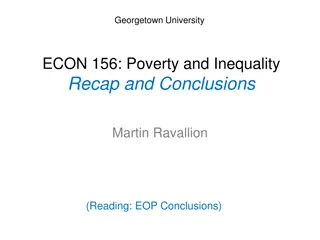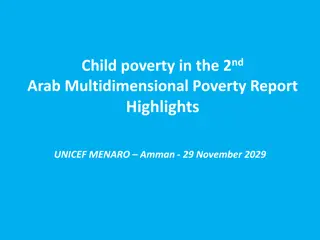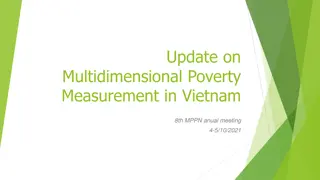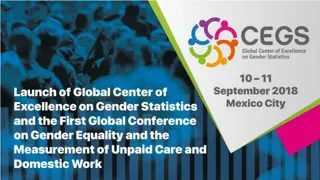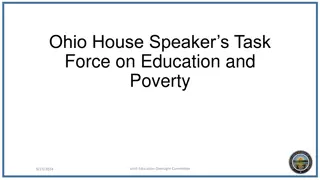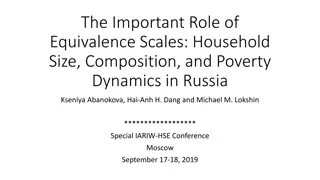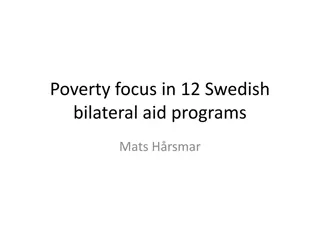Working Together to Tackle Poverty's Impact on Education
This report delves into partnership efforts among schools, local authorities, and various agencies to address the effects of poverty on educational achievement. Highlighting best practices through case studies, the study emphasizes the importance of prioritizing poverty alleviation in educational settings. Findings reveal varying degrees of focus on improving outcomes for disadvantaged learners, with successful schools prioritizing individual student needs to raise standards and well-being. Collaboration with specialized services plays a significant role in meeting diverse learner requirements.
Download Presentation

Please find below an Image/Link to download the presentation.
The content on the website is provided AS IS for your information and personal use only. It may not be sold, licensed, or shared on other websites without obtaining consent from the author. Download presentation by click this link. If you encounter any issues during the download, it is possible that the publisher has removed the file from their server.
E N D
Presentation Transcript
Gweithio gydan gilydd i fynd ir afael ag effaith tlodi ar gyflawniad addysgol Working together to tackle the impact of poverty on educational achievement
Cefndir Background This is the third report in a series on what can be done to improve outcomes for disadvantaged learners. This latest report looks more closely at the partnership work between schools, local authorities and various agencies and services to tackle the impact of poverty on educational achievement. The report includes case studies of best practice. Dyma r trydydd adroddiad mewn cyfres ar beth y gellir ei wneud i wella deilliannau i ddysgwyr difreintiedig. Mae r adroddiad diweddaraf hwn yn bwrw golwg fanylach ar y gwaith mewn partneriaeth rhwng ysgolion, awdurdodau lleol ac amrywiol asiantaethau a gwasanaethau i fynd i r afael ag effaith tlodi ar gyflawniad addysgol. Mae r adroddiad yn cynnwys astudiaethau achos o arfer orau.
Cefndir Background Mae r adroddiad hwn wedi i seilio ar dystiolaeth o ymweliadau 26 ysgol. Roedd y sampl yn cynnwys 10 ysgol uwchradd ac 16 ysgol gynradd. Mae o leiaf 20% o ddisgyblion pob ysgol yn yr arolwg yn gymwys i gael prydau ysgol am ddim ac mae r ysgolion wedi u lleoli mewn ardaloedd o ddifreintedd economaidd- gymdeithasol uchel. Ymwelodd arolygwyr chwech awdurdod lleol ar draws Cymru, bob un ohonynt lefelau uchel o amddifadedd. This report is based on evidence from visits to 26 schools. The sample included 10 secondary schools and 16 primary schools. All schools in the survey have at least 20% of their learners eligible for free school meals and are situated in areas of high socio-economic disadvantage. Inspectors visited six local authorities across Wales, all with high levels of deprivation.
Prif ganfyddiadau Main findings Er bod llawer o ysgolion wedi canolbwyntio n fwy ar bwysigrwydd gwella safonau a lles disgyblion difreintiedig yn ddiweddar, nid yw mynd i r afael thlodi yn flaenoriaeth digon uchel o hyd i bob ysgol. Er enghraifft, dim ond lleiafrif o ysgolion oedd chynlluniau penodol ar gyfer hyfforddiant mewn swydd ar leihau effaith tlodi ar gyrhaeddiad yn 2012- 2013. Although many schools have recently become more focused on the importance of improving the standards and wellbeing of disadvantaged pupils, tackling poverty is still not a high enough priority for all schools. For example, only a minority of schools had specific plans for in- service training on reducing the impact of poverty on attainment in 2012-2013.
Prif ganfyddiadau Main findings Mae r ychydig ysgolion sydd wedi llwyddo i godi safonau a lles dysgwyr difreintiedig yn canolbwyntio ar anghenion dysgwyr unigol. Pan fydd gan ddysgwyr anghenion cymhleth nad yw r ysgol yn gallu u bodloni ar ei phen ei hun, mae r ysgolion hyn yn gweithio gydag asiantaethau i gynnig gwasanaethau teuluol eang i fodloni r anghenion hynny, neu gallant weithio gyda gwasanaethau arbenigol i fodloni anghenion iechyd neu les penodol. The few schools that succeed in raising the standards and wellbeing of disadvantaged learners focus on the needs of individual learners. Where learners have complex needs that the school cannot meet on its own, these schools work with agencies to provide broad family-related services to meet those needs, or they may work with specialist services to meet specific health or wellbeing needs.
Prif ganfyddiadau Main findings Pupils in schools that are involved in Team around the family (TAF) approaches benefit from multi-agency working. The pool of skills within the team means that the health, domestic and social welfare concerns of learners and their families can be addressed. A minority of schools we visited identified shortcomings in the implementation of this model, including failing to ensure that all agencies are represented at meetings to discuss progress and agree strategies. Mae disgyblion mewn ysgolion sy n mabwysiadu dulliau r T m o amgylch y teulu yn elwa o weithio amlasiantaeth. Mae r gronfa o fedrau yn y t m yn golygu bod modd mynd i r afael phryderon iechyd, domestig a lles cymdeithasol dysgwyr a u teuluoedd. Roedd lleiafrif o ysgolion yr ymwelom nhw wedi nodi diffygion wrth weithredu r model hwn, gan gynnwys methu sicrhau bod pob asiantaeth wedi i chynrychioli mewn cyfarfodydd i drafod cynnydd a chytuno ar strategaethau.
Prif ganfyddiadau Main findings It is a challenge for schools to co-ordinate and manage the work of several external partners. The few schools that raise the standards and wellbeing of disadvantaged learners significantly, identify a senior member of staff to co- ordinate the work with partners. These schools know about and understand the support that the pupil receives from an external partner and staff monitor progress carefully. Mae cydlynu a rheoli gwaith nifer o bartneriaid allanol yn her i ysgolion. Mae r ychydig ysgolion sy n codi safonau a lles dysgwyr difreintiedig yn sylweddol, yn dewis uwch aelod staff i gydlynu r gwaith gyda phartneriaid. Mae r ysgolion hyn yn gwybod am y cymorth y mae r disgybl yn ei gael gan bartner allanol, ac yn ei ddeall, ac mae staff yn monitro cynnydd yn ofalus.
Prif ganfyddiadau Main findings Mae ychydig ysgolion wedi llunio dulliau o wella deilliannau ar gyfer dysgwyr difreintiedig ar draws cyfnodau drwy eu gwaith clwstwr. Mae hyn yn wedi helpu r disgyblion i symud o r ysgol gynradd i r ysgol uwchradd drwy eu cefnogi, er enghraifft, yn eu dysgu cymdeithasol ac emosiynol, ac mewn llythrennedd. Ychydig o gymunedau dysgu proffesiynol o athrawon sy n canolbwyntio n uniongyrchol ar dlodi. A few schools have designed approaches to improving outcomes for disadvantaged learners across phases through their cluster work. This has helped the pupils move from primary to secondary school by supporting them, for instance in their social and emotional learning, and in literacy. Few professional learning communities of teachers focus on poverty directly.
Prif ganfyddiadau Main findings Yn yr achosion gorau, mae ysgolion yn arfarnu eu gwaith eu hunain a gwaith asiantaethau allanol yn l mesurau clir o berfformiad dysgwyr. Mae r ysgolion hyn yn defnyddio data i arfarnu effaith mentrau newydd a rhannant wybodaeth am berfformiad gyda phartneriaid er mwyn helpu i gysylltu dulliau r ysgol ag ymyriadau eraill. In the best cases, schools evaluate their own work and that of external agencies against clear measures of learner performance. These schools use data to evaluate the impact of new initiatives and share performance information with partners to help to join up the school s approaches with other interventions.
Prif ganfyddiadau Main findings Mae cyflwyno r Grant Amddifadedd Disgyblion wedi ehangu ystod y strategaethau ar gyfer gwella deilliannau i ddysgwyr difreintiedig. Fodd bynnag, mewn llawer o ysgolion, mae r grant yn cael ei ddefnyddio i wella cyflawniad pob dysgwr gallu is ac ni chaiff ei gyfeirio n benodol tuag at ddysgwyr difreintiedig. Yn yr ysgolion hyn, mae diffygion o ran sut caiff y Grant ei wario yn debyg i r diffygion a amlygodd Estyn yn gysylltiedig chyllid Rhagori yn y gorffennol. The introduction of the Pupil Deprivation Grant (PDG) has widened the range of strategies to improve the outcomes for disadvantaged learners. However, in many schools, the grant is used to raise the achievement of all lower-ability learners and is not specifically directed towards disadvantaged learners. In these schools, there are shortcomings in how the PDG is spent that are similar to those that Estyn identified in relation to RAISE funding in the past.
Prif ganfyddiadau Main findings Er bod awdurdodau lleol yn canolbwyntio ar fynd i r afael ag effaith tlodi, dim ond ychydig ohonynt sydd wedi gwella safonau a lles dysgwyr difreintiedig yn sylweddol. Mae r ychydig awdurdodau lleol sy n codi safonau a lles dysgwyr difreintiedig yn mabwysiadu dull ataliol o fynd i r afael ag effaith tlodi. Although local authorities have a focus on tackling the impact of poverty, only a few have significantly improved the standards and wellbeing of disadvantaged learners. The few local authorities that do raise the standards and wellbeing of disadvantaged learners take a preventative approach to tackling the impact of poverty.
Prif ganfyddiadau Main findings Nid yw awdurdodau lleol bob amser yn rhannu gwybodaeth am ddysgwyr difreintiedig gydag asiantaethau a gwasanaethau eraill. Local authorities do not always share information about disadvantaged learners with other agencies and services. At ei gilydd, nid yw gwasanaethau gwahanol mewn awdurdod lleol neu gonsortia yn alinio eu cynlluniau nac yn defnyddio dangosyddion perfformiad cyffredin ar gyfer mynd i r afael thlodi. Mae hyn yn golygu ei bod hi n anodd mesur cynnydd ar y cyd. Generally, different services in a local authority or consortia do not align their plans or use common performance indicators for tackling poverty. This means that it is difficult to measure progress jointly.
Prif ganfyddiadau Main findings Nid oes amcanion digon penodol yn ymwneud chau r bwlch rhwng deilliannau dysgwyr breintiedig a difreintiedig gan lawer o awdurdodau lleol. Nid ydynt yn herio ysgolion yn ddigon cadarn i wella deilliannau ar gyfer dysgwyr difreintiedig. Dim ond ychydig awdurdodau lleol sy n rhoi cyngor da i ysgolion ar sut i ddefnyddio eu Grant Amddifadedd Disgyblion. Nid oes digon o gyfleoedd hyfforddi lle y gall arweinwyr ysgol ddysgu am ddulliau strategol o fynd i r afael ag effaith tlodi. Many local authorities do not have specific enough objectives related to closing the gap in outcomes between advantaged and disadvantaged learners. They do not challenge schools robustly enough to improve outcomes for disadvantaged learners. Only a few local authorities give good advice to schools about how to use their PDG. There are too few training opportunities for school leaders to learn about strategic approaches to tackling the impact of poverty.
Argymhellion Recommendations In order to continue improving the performance of disadvantaged learners,schools should: adopt clear systems for working with outside agencies to support disadvantaged learners, for example the Team around the family approach; work with other agencies to engage disadvantaged families more in school life; work more closely with partner schools to develop a common approach to tackling poverty and to support pupils transition from primary to secondary school; Er mwyn parhau i wella perfformiad dysgwyr difreintiedig, dylai ysgolion: fabwysiadu systemau clir ar gyfer gweithio gydag asiantaethau allanol i gefnogi dysgwyr difreintiedig, er enghraifft dull y T m o amgylch y teulu ; gweithio gydag asiantaethau eraill i gynnwys teuluoedd difreintiedig yn fwy ym mywyd yr ysgol; gweithio n agosach gydag ysgolion partner i ddatblygu dull cyffredin o fynd i r afael thlodi a chefnogi disgyblion wrth bontio o r ysgol gynradd i r ysgol uwchradd;
Argymhellion Recommendations dewis uwch aelod staff i gydlynu gwaith gyda gwasanaethau ac asiantaethau allanol; gwneud yn siwr bod staff yn gwybod sut i gynyddu cyflawniad dysgwyr difreintiedig; defnyddio systemau i olrhain cynnydd disgyblion er mwyn arfarnu mentrau sy n ceisio gwella lles a safonau; a defnyddio r Grant Amddifadedd Disgyblion i dargedu anghenion disgyblion difreintiedig yn benodol, waeth beth yw eu gallu. identify a senior member of staff to co-ordinate work with external services and agencies; make sure that staff know how to raise the achievement of disadvantaged learners; use systems to track pupils progress in order to evaluate initiatives that seek to improve wellbeing and standards; and use the Pupil Deprivation Grant to target the needs of disadvantaged pupils specifically, whatever their ability.
Argymhellion Recommendations Local authorities and consortia should: work with relevant services and agencies to map the specific needs of disadvantaged pupils and their families and share this information with schools and other agencies on the basis of an agreed protocol; take a preventative approach to tackling poverty and use Team around the family approaches in co-ordinating services for disadvantaged families; Dylai awdurdodau lleol a chonsortia: weithio gyda gwasanaethau ac asiantaethau perthnasol i fapio anghenion penodol disgyblion difreintiedig a u teuluoedd a rhannu r wybodaeth hon gydag ysgolion ac asiantaethau eraill yn l protocol y cytunwyd arno; mabwysiadu dull ataliol o fynd i r afael thlodi a defnyddio dulliau r T m o amgylch y teulu wrth gydlynu gwasanaethau ar gyfer teuluoedd difreintiedig;
Argymhellion Recommendations sicrhau bod cynlluniau strategol ar gyfer mynd i r afael thlodi wedi u halinio i gynnwys gwasanaethau mewnol a phartneriaid allanol a bod ganddynt amcanion penodol a mesuradwy; darparu hyfforddiant a chymorth i ddatblygu medrau arweinwyr ysgol i reoli gwaith mewn partneriaeth er mwyn mynd i r afael thlodi; a darparu neu frocera cyngor gwell i ysgolion ar ffyrdd ymarferol o fynd i r afael ag effaith tlodi. make sure that strategic plans to tackle poverty are aligned to include internal services and external partners and have specific and measurable objectives; provide training and support to develop the skills of school leaders to manage partnership working to tackle poverty; and provide or broker better advice to schools on practical ways to tackle the impact of poverty.
Arfer orau Best practice Mae Ysgol Gynradd Alexandra yn Wrecsam wedi gwella presenoldeb a lles drwy ariannu rheolwr lles gan ddefnyddio r Grant Amddifadedd Disgyblion. Mae r rheolwr yn cydweithio gwasanaethau arbenigol a rhieni. Caiff y r l ei harfarnu drwy brosesau rheoli perfformiad wedi u seilio ar welliannau o ran presenoldeb, perfformiad ac agweddau. Mae r effaith yn cynnwys: gwelliannu i bawb yn y dangosydd pwnc craidd a lleihau r bwlch rhwng perfformiad dysgwyr difreintiedig a dysgwyr eraill; gwelliant flwyddyn ar l blwyddyn o ran presenoldeb a dim gwaharddiadau; addysgu a dysgu mwy effeithiol a mwy o amser i r pennaeth ganolbwyntio ar wella r ysgol; gostyngiad yn absenoldeb athrawon oherwydd straen; a pherthynas well disgyblion a rhieni. Alexandra Primary School in Wrexham has improved attendance and wellbeing by funding a wellbeing manager using the PDG. The manager liaises with specialist services and with parents. The role is evaluated through performance management processes based on improvements in attendance, performance and attitudes. The impact includes: improvement in core subject indicator for all and narrowing of gap in performance between disadvantaged and other learners; year-on-year improvement in attendance and no exclusions; more effective teaching and learning and more time for headteacher to focus on school improvement; a reduction in teachers sickness absence due to stress; and improved relationships with pupils and parents.
10 cwestiwn i ddarparwyr 10 questions for providers Ysgolion: A yw mynd i r afael difreintedd yn flaenoriaeth uchel yn ein cynllun gwella? Pa mor dda ydym ni n deall anghenion ein dysgwyr difreintiedig ac yn gwybod sut i wella u cyflawniad? Pa mor dda ydym ni n cydweithio ag asiantaethau a gwasanaethau allanol ac a yw r dulliau wedi u cydlynu n dda? A ydym ni n arfarnu effaith pob dull o fynd i r afael thlodi gan ddefnyddio targedau penodol a mesuradwy? Beth yn fwy allwn ni ei wneud i ymgysylltu theuluoedd dysgwyr difreintiedig? Schools: Is addressing disadvantage a high priority in our improvement plan? How well do we understand the needs of our disadvantaged learners and know how to raise their achievement? How well do we liaise with outside agencies and services and are approaches well co-ordinated? Do we evaluate the impact of all approaches to tackling poverty using specific and measurable targets? What more can we do to engage with the families of disadvantaged learners?
10 cwestiwn i ddarparwyr 10 questions for providers Local authorities and consortia: How well aligned is our planning -do we have specific and measurable targets, shared across services to improve outcomes for disadvantaged learners? How can we work in a more preventative way? How can we support and challenge schools to work with outside agencies? What training can we provide for school leaders to address issues of poverty and work in partnership? Awdurdodau lleol a chonsortia: A yw ein cynllunio wedi i alinio n dda a oes gennym dargedau penodol a mesuradwy, wedi u rhannu ar draws gwasanaethau, i wella deilliannau ar gyfer dysgwyr difreintiedig? Sut gallwn ni weithio mewn ffordd fwy ataliol? Sut gallwn ni gefnogi a herio ysgolion i weithio gydag asiantaethau allanol? Pa hyfforddiant gallwn ni ei ddarparu i arweinwyr ysgol er mwyn mynd i r afael materion tlodi a gweithio mewn partneriaeth?
Dolen ir adroddiad cyfan Cymraeg Web-link to full report
Cwestiynau... Questions





